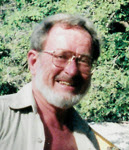
Interview with writer Carl Von Essen: “The Hunter’s Trance: Nature, Spirit and Ecology.”
Carl Francis Von Essen is a M.D. who has studied medicine in California and Sweden. He has practiced and taught in the United States, India, Switzerland, and served the World Health Organization in Sir Lanka and Zimbabwe. He is the author of “The Revenge of the Fish God: Angling Adventures Around The World.” His new book is titled:” The Hunter’s Trance: Nature, Spirit and Ecology.” It deals with the feelings that can be released from deep within us as evoked by nature. It explores the phenomena of nature mysticism through the perspective of poet, outdoors people, scientists and others. Von Essen believes that this exposure to our inherent spiritual power can curb the threat of a global environmental disaster. I spoke with Von Essen on my show: “Poet to Poet: Writer to Writer” on Somerville Community Access TV.
Doug Holder: The book explores nature mysticism, its psychic and biological roots. It is a celebration of nature, the sometimes ecstatic feeling it evokes, which at times has an almost religious fervor. Do you believe ‘God” is behind nature? Are you a religious man?’
Carl Von Essen: No. A spiritual man I hope. And I make a distinction I hope between spirituality and religion. It is sort of an arbitrary separation I think. I think we are all religious, and perhaps we are all spiritual. Perhaps spirituality leads to religion. Organized religion is a step beyond. But I am not a church goer. I believe there is a force in the universe that created us.
DH: What is your definition of spirituality?
CVE: Spirituality to me is the sensation beyond our actual mundane life; what is beyond what we see and feel. There is a feeling of unity with the Cosmos. A feeling of a unity with nature. We are part of everything else. We are not unique. Nor is life unique.
DH: Was this book more important for you to write now that you are well into the second half of the roller coaster ride so to speak?
CVE: I suppose. I retired many years ago. Up to that point I was involved with career and other matters. I had not that much time to think. I have had more time to think ever since. Also I am a fisherman, and fishermen can be quite philosophical.
DH: Obviously being a MD and a man of means, you were able to travel the world and experience the grandeur of nature. You are more than a tourist, yet you are passing through. The poet Les Murray once pointed out that if someone was born into a third world country and experienced draught and floods, the relentless summer heat, he might have a less celebratory attitude to nature.
CVE: True. Nature is by no means kind to us. Nature is neutral. Somebody who has been raised in rugged conditions would know this. Humankind has caused most rugged conditions though. Natural man coexisted with his surroundings. We have created urban jungles, sprawl, and the destruction of nature. Man has created all this in the last several centuries.
DH: You have a great love of nature. Why do you live in the city of Cambridge, Mass.?
CVE: Well, I used to live in the countryside. We have a duty to protect our environment. Living amidst urban surroundings can be a form of protecting our surroundings. And we can still go out to the country. When urbanization is done properly, we can enjoy nature. I can walk along the Charles River and that feeling of being one with nature can be achieved.
DH: The title of your book is the “Hunter’s Trance.” The “Hunter’s Trance,” is a total mental and physical concentration whereby extraneous signals, internal and external are diverted. The hunter goes into a meditative state where he merges with the world as he tracks his prey. Would you say then the gun-toting, NRA member, hunting a deer, is more in touch with nature than the average Joe?
CVE: Yes he might be. When you say “Average Joe” what is that?
DH: You write that it is important to instill a love of nature in children. You said it should be taught in schools. Do you have any sort of program in mind?
CVE: Well I don’t have answers to that question. Wilderness programs for the young should be fostered and encouraged. The very young are the most spiritual, as far as I can see. In youth we are more with nature, and then there is a gradual decline.
DH: Would most scientists describe this ecstasy with nature as purely biological—perhaps as psychosis?
CVE: No it’s not biological. The question of psychosis is another question. Mysticism has often been associated with psychosis. It is called a “altered state of consciousness.” This state is a huge basket of conditions that include audio and visual hallucinations. Pure and simple spirituality of being, having a wonderful feeling in nature, is not psychotic.
DH: Can I get that ecstatic feeling walking on a verdant stretch of Highland Ave.in Somerville instead of on a mountain in Tibet?
CVE: You can have it anywhere. T.S. Eliot had it when he was a student in Boston. People say it guided his writing and life ever since.